|
Tires should wear evenly across the entire surface
of the tread. swiss replica watches
Any tire wear that deviates from the norm may
indicate one of the following issues:
- Improper inflation pressures
- Unbalanced tire, wheel or rotor
- Suspension or alignment problems
- Brake problems
- Tire fault, or misuse
Here are some examples of irregular wear
indicating a problem:
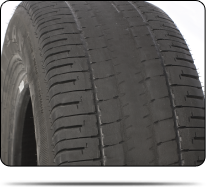
Center
Wear
Center wear is typically due to over-inflation. The maximum inflation
pressure, listed on the tire, is for when
the vehicle is fully loaded. Center wear may
also be caused by mounting oversized tires
onto narrow rims. |
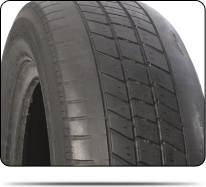
Shoulder
Wear
Shoulder wear is often the result of low
tire pressure, overloading the vehicle, or
the use of undersized tires. |
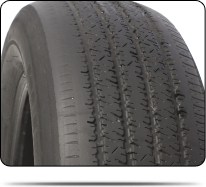
Camber
Wear
Camber wear results when the tire is not
vertically aligned properly with the surface
of the road. Camber wear can be caused by a
weak, broken, or incorrect spring. Excessive
negative camber typically results in inside
edge wear. Excessive positive camber
typically results in outside edge wear. |
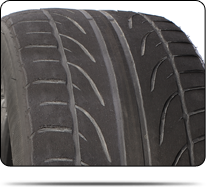
High-Speed Feathering
Heavy shoulder wear (typically feathered
tread front to rear) can be caused by hard
driving. Inspect anti-sway bar end links and
springs for wear. A performance tire, or one
with a stiffer side wall, can reduce high
speed feathering of tires. Audemars Piguet replica watches
|
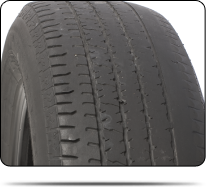
Toe Wear
Toe wear results when the tire is not
aligned parallel to the center-line of the
vehicle. Basically, the tire may point "Toe
In" or "Toe Out." Since toe can cause rapid
wear, it is considered the most important
alignment angle. Excessive toe results in a
"saw toothed" pattern of wear across the
tread surface. |
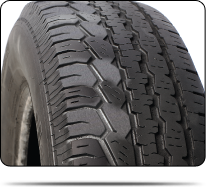
Cupped
Wear
Cupped or scalloped dips appearing around
the surface of the tread could indicate
loose, worn, or sometimes bent suspension
parts. Worn shock absorbers or unbalanced
tires / wheels / brake rotors can also cause
cupping, but the cupping would typically be
more of a concentric pattern. |
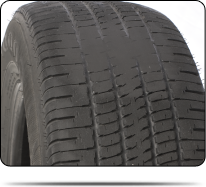
Brake
Skid / Flat Spot Wear
When a tire slides across the road surface,
it will scuff away the tread in one area.
This generally happens as a result of the
brakes locking up due to brake malfunction
or the driver aggressively applying the
brakes in an emergency situation. Flat
spotting can also occur if the tire sat in
oil, fuel or chemicals, or if the belts of
the tire have shifted internally. |
|



